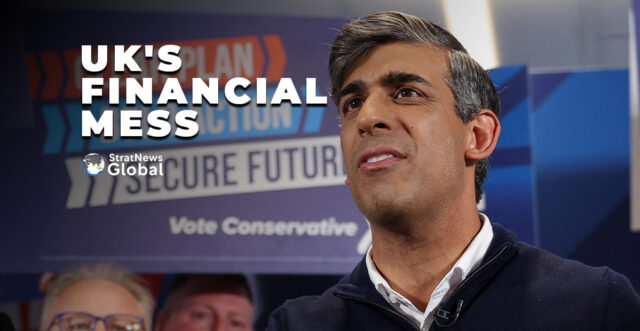The UK’s stretched finances are “the elephant in the room” in this election given the UK’s near 100% debt-to-GDP ratio, S&P Global says.
Despite the UK’s stretched finances, all parties are promising to mend crumbling public services and invest in infrastructure without hiking key taxes. But the market panic when then-Prime Minister Liz Truss vowed to spend big in 2022 is a clear warning against being too radical.
“We are interested in the balance between revenue and expenditure adjustments, which will enable them (new government) to improve the underlying fiscal position,” S&P’s Frank Gill explained.
With a relatively modest 1.3 percentage point of GDP primary budget deficit likely this year, the UK isn’t as far away from a debt-stabilizing balance as G7 peers the U.S., France and Italy are at least.
“But still, there are questions about the composition of consolidation over the next few years… We try to take a view on the sustainability of the fiscal mix. What’s really achievable and what’s not,” said Gill.
2/ HOW MUCH ECONOMIC GROWTH?
Fitch raised its AA- UK rating outlook to “stable” in March, bringing it in line with Moody’s but still a grade lower than S&P’s AA score.
Its “cautious” projections assumed “a balancing of policy priorities against reducing risks to the sustainability of public finances”, noting how the UK’s debt-to-GDP number was more than double the 48% of GDP median for ‘AA’ bracket countries.
Stagnant economic growth, averaging just 1.6% a year over the last decade, will need to pick up considerably, however, to prevent the rating slipping back.
Achieving that won’t be easy given the headwinds of net migration as well as labour market participation and productivity growth issues.
3/ RULES BRITANNIA
There is also the question of whether changes will be made to the UK’s self-imposed fiscal rules, which require public sector debt to fall as a share of GDP over a five-year period.
Some top Labour officials have suggested serious reforms are off the table for now, given markets are sensitive.
The 2024-25 financial year is set to be the second-highest for government debt issuance on record at 278 billion pounds ($350 billion) though, and the interest bill on Britain’s debt alone was a staggering 111 billion pounds last year, roughly 4.4% of GDP.
What is reassuring is that the 10-year gilt yield, which is a proxy for the UK government’s borrowing costs, is down from last year’s highs at just over 4.1%.
4/ RESERVE CURRENCY STATUS
European-based rating firm, Scope, wants to know what will be done to ensure the pound retains is coveted global reserve currency status that helps the UK sell its debt, especially as alternatives such as China’s yuan rise up.
“Is there anything that might be done to ensure sterling’s current strong place within the global monetary system?,” said Scope’s Dennis Shen.
He added “a stable government managing credible budgetary policies” was the best way do it, “as might enhancing access to the (EU) Single Market,” pointing to the hard job of healing post-Brexit scars.
5/ RENATIONALISATIONS?
Relentless amounts of raw sewage pouring into the UK’s rivers and seas from privatised water companies have been a hot election topic with parties vowing to take action.
Investors are already bailing out of big water firms such as Thames, worried about being on the hook for the huge amounts of money that needs to be spent to solve that problem.
If they don’t stump up though, the likes of Thames could go under in their current form, some in the industry have warned.
That would mean the government would need to step in and run them, which would be both complex and costly and add to the UK’s debt.
“If that has to be funded, it would be reflected in their (UK’s) fiscal assessment,” Gill said. “Will it be enough to change the UK rating? I would doubt it, because it’s really a confluence of factors,” which would lead to that.
With Reuters inputs
Thirty eight years in journalism, widely travelled, history buff with a preference for Old Monk Rum. Current interest/focus spans China, Technology and Trade. Recent reads: Steven Colls Directorate S and Alexander Frater's Chasing the Monsoon. Netflix/Prime video junkie. Loves animal videos on Facebook. Reluctant tweeter.





